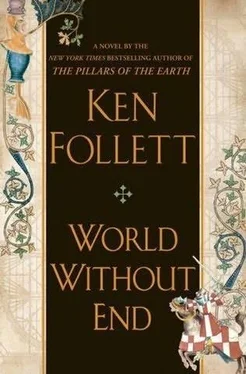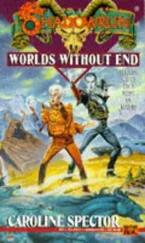“No,” said Ralph. “I will not transfer the land to you.” He grinned. “You and your bride can eat madder.”
Caris had to prevent Philemon becoming bishop. This was his boldest move yet, but he had made his preparations carefully, and he had a chance. If he succeeded, he would have control of the hospital again, giving him the power to destroy her life’s work. But he could do worse than that. He would revive the blind orthodoxy of the past. He would appoint hard-hearted priests like himself in the villages, close schools for girls and preach sermons against dancing.
She had no say in the choice of a bishop, but there were ways to exert pressure.
She began with Bishop Henri.
She and Merthin travelled to Shiring to see the bishop in his palace. On the way, Merthin stared at every dark-haired girl that came into view, and when there was no one he scanned the woods at the side of the road. He was looking for Lolla, but they reached Shiring without seeing any sign of her.
The bishop’s palace was on the main square, opposite the church and beside the Wool Exchange. It was not a market day, so the square was clear but for the scaffold that stood there permanently, a stark warning to villains of what the people of the county did to those who broke the law.
The palace was an unpretentious stone building with a hall and chapel on the ground floor and a series of offices and private apartments upstairs. Bishop Henri had imposed upon the place a style that Caris thought was probably French. Each room looked like a painting. The place was not decorated extravagantly, like Philemon’s palace in Kingsbridge, where the profusion of rugs and jewels suggested a robber’s cave. However, there was something pleasantly artful about everything in Henri’s house: a silver candlestick placed to catch the light from a window; the polished gleam of an ancient oak table; spring flowers in the cold fireplace; a small tapestry of David and Jonathan on the wall.
Bishop Henri was not an enemy, but he was not quite an ally either, Caris thought nervously as they waited for him in the hall. He would probably say that he tried to rise above Kingsbridge quarrels. She, more cynically, thought that whatever decision he had to make, he remained unshakeably focused on his own interests. He disliked Philemon, but he might not allow that to affect his judgement.
Henri came in followed, as always, by Canon Claude. The two of them did not seem to age. Henri was a little older than Caris, and Claude perhaps ten years younger, but they both looked like boys. Caris had noticed that clergy often aged well, better than aristocrats. She suspected it was because most priests – with some notorious exceptions – led lives of moderation. Their regime of fasting obliged them to eat fish and vegetables on Fridays and saints’ days and all through Lent, and in theory they were never allowed to get drunk. By contrast, noblemen and their wives indulged in orgies of meat-eating and heroic wine-drinking. That might be why their faces became lined, their skin flaky and their bodies bent, while clerics stayed fit and spry later into their quiet, austere lives.
Merthin congratulated Henri on having been nominated archbishop of Monmouth, then got straight to the point. “Prior Philemon has stopped work on the tower.”
Henri said with studied neutrality: “Any reason?”
“There’s a pretext, and a reason,” Merthin said. “The pretext is a fault in the design.”
“And what is the alleged fault?”
“He says an octagonal spire can’t be built without formwork. It is generally true, but I’ve found a way around it.”
“Which is…?”
“Rather simple. I will build a round spire, which will need no formwork, then give its exterior a cladding of thin stones and mortar in the shape of an octagon. Visually, it will be an octagonal spire, but structurally it will be a cone.”
“Have you told Philemon this?”
“No. If I do, he’ll find another pretext.”
“What is his real reason?”
“He wants to build a Lady chapel instead.”
“Ah.”
“It’s part of a campaign to ingratiate himself with senior clergy. He preached a sermon against dissection when Archdeacon Reginald was there. And he has told the king’s advisers that he will not campaign against taxation of the clergy.”
“What is he up to?”
“He wants to be bishop of Shiring.”
Henri raised his eyebrows. “Philemon always had nerve, I’ll give him that.”
Claude spoke for the first time. “How do you know?”
“Gregory Longfellow told me.”
Claude looked at Henri and said: “Gregory would know if anyone does.”
Caris could tell that Henri and Claude had not anticipated that Philemon would be so ambitious. To make sure they did not overlook the significance of the revelation, she said: “If Philemon gets his wish, you as archbishop of Monmouth will have endless work adjudicating disputes between Bishop Philemon and the townspeople of Kingsbridge. You know how much friction there has been in the past.”
Claude said: “We certainly do.”
“I’m glad we’re in agreement,” Merthin said.
Thinking aloud, Claude said: “We must put forward an alternative candidate.”
That was what Caris had hoped he would say. “We have someone in mind,” she said.
Claude said: “Who?”
“You.”
There was a silence. Caris could tell that Claude liked the idea. She guessed he might be quietly envious of Henri’s promotion, and wondering whether it was his destiny always to be a kind of assistant to Henri. He could easily cope with the post of bishop. He knew the diocese well and handled most of the practical administration already.
However, both men were now surely thinking about their personal lives. She had no doubt they were all but husband and wife: she had seen them kissing. But they were decades past the first flush of romance, and her intuition told her they could tolerate a part-time separation.
She said: “You would still be working together a good deal.”
Claude said: “The archbishop will have many reasons to visit Kingsbridge and Shiring.”
Henri said: “And the bishop of Kingsbridge will need to come to Monmouth often.”
Claude said: “It would be a great honour to be bishop.” With a twinkle in his eye he added: “Especially under you, archbishop.”
Henri looked away, pretending not to notice the double meaning. “I think it’s a splendid idea,” he said.
Merthin said: “The Kingsbridge guild will back Claude – I can guarantee that. But you, Archbishop Henri, will have to put the suggestion to the king.”
“Of course.”
Caris said: “If I may make one suggestion?”
“Please.”
“Find another post for Philemon. Propose him as, I don’t know, archdeacon of Lincoln. Something he would like, but that would take him many miles from here.”
“That’s a sound idea,” Henri said. “If he’s up for two posts, it weakens his case for either one. I’ll keep my ear to the ground.”
Claude stood up. “This is all very exciting,” he said. “Will you have dinner with us?”
A servant came in and addressed Caris. “There’s someone asking for you, mistress,” the man said. “It’s only a boy, but he seems distressed.”
Henri said: “Let him come in.”
A boy of about thirteen appeared. He was dirty, but his clothes were not cheap, and Caris guessed he came from a family that was comfortably off but suffering some kind of crisis. “Will you come to my house, Mother Caris?”
“I’m not a nun any more, child, but what’s the problem?”
The boy spoke fast. “My father and mother are ill and so is my brother, and my mother heard someone say you were at the bishop’s palace and said to fetch you, and she knows you help the poor but she can pay, but will you please come, please?”
Читать дальше












